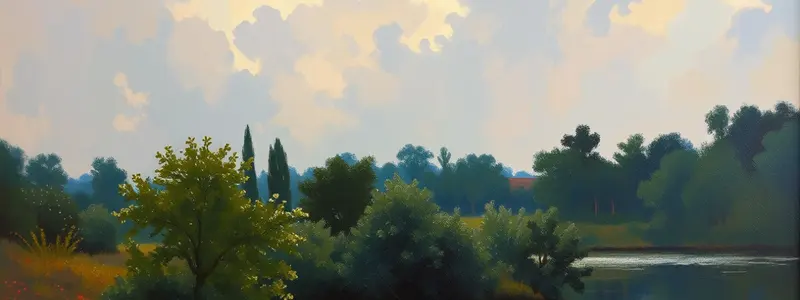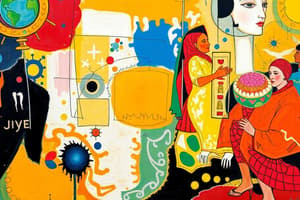Podcast
Questions and Answers
What does the Latin word 'ars' mean in relation to art?
What does the Latin word 'ars' mean in relation to art?
- Creativity and originality
- Ability or skill (correct)
- Beauty in nature
- Cultural tradition
How does art serve as a form of communication?
How does art serve as a form of communication?
- It confines identity to a specific culture
- It showcases only aesthetic beauty
- It expresses political and spiritual ideas (correct)
- It reflects personal experiences
Which characteristic of art appreciation emphasizes the subjectivity of experiences?
Which characteristic of art appreciation emphasizes the subjectivity of experiences?
- Exclusivity of judgment
- Universal appeal
- Cultural connection
- Emotional response (correct)
What role does imagination play in creativity?
What role does imagination play in creativity?
Which statement best describes the relationship between art and culture?
Which statement best describes the relationship between art and culture?
What is the essence of art appreciation as defined in the content?
What is the essence of art appreciation as defined in the content?
What distinguishes art from nature according to the content?
What distinguishes art from nature according to the content?
What is a key focus of creativity in the context of art?
What is a key focus of creativity in the context of art?
Flashcards are hidden until you start studying
Study Notes
Why Study Art?
- Engaging with art offers new experiences and perspectives.
- Art represents human creativity and inventiveness.
- It encompasses a broad range of activities from expression to creation.
Definition of Art
- Originates from the Latin word "ars," which signifies ability or skill.
- The Italian term "artis" denotes craftsmanship and mastery.
Art and Culture
- Art is deeply rooted in culture, linking the past, present, and future.
- Functions as a medium for communicating ideas and emotions related to political, philosophical, and spiritual themes.
- Reflects and binds the identity of cultures, highlighting their uniqueness.
The Universality of Art
- Art has existed as long as humanity, serving as a testament to human achievement.
Distinction Between Art and Nature
- Art is a man-made construct, distinguishing it from natural phenomena.
Experience in Art
- Experiencing art involves active engagement rather than passive observation.
- True appreciation of art can only be attained through personal experiences.
Characteristics of Art Experience
- The experience of art is subjective, meaning interpretations can vary widely among individuals.
- Personal judgments on art are influenced by unique emotional responses, leading to likes or dislikes.
Art Appreciation
- Involves understanding and enjoying works of art.
- Enhances awareness of art's societal role and cultivates good taste.
- Engages with both artworks and artists, influencing personal and emotional responses.
Imagination
- Involves envisioning non-existent ideas and visualizing the impossible.
Creativity
- Utilizes imagination to formulate new ideas and create tangible expressions that hold value.
- Acts as a process that transforms the impossible into reality.
Expression
- The act of articulating one's thoughts and emotions.
Studying That Suits You
Use AI to generate personalized quizzes and flashcards to suit your learning preferences.




